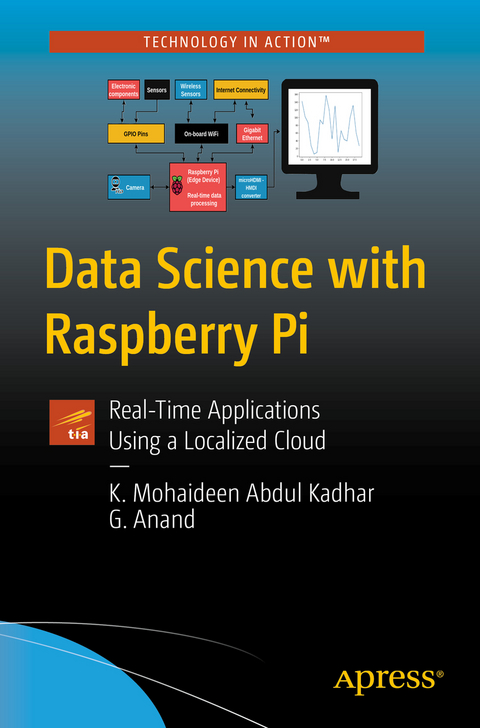
Data Science with Raspberry Pi
Apress (Verlag)
978-1-4842-6824-7 (ISBN)
You’ll start with a brief introduction to data science followed by a dedicated look at the fundamental concepts of Python programming. Here you’ll install the software needed for Python programming on the Pi, and then review the various data types and modules available. The next steps are to set up your Pis for gathering real-time data and incorporate the basic operations of data science related to real-time applications. You’ll then combine all these new skills to work with machine learning concepts that will enable your Raspberry Pi to learn from the data it gathers. Case studies round out the book to give you an idea of the range of domains where these concepts can be applied.
By the end of Data Science with the Raspberry Pi, you’ll understand that many applications are now dependent upon cloud computing. As Raspberry Pis are cheap, it is easy to use a number of them closer to the sensors gathering the data and restrict the analytics closer to the edge. You’ll find that not only is the Pi an easy entry point to data science, it also provides an elegant solution to cloud computing limitations through localized deployment.
What You Will Learn
Interface the Raspberry Pi with sensors
Set up the Raspberry Pi as a localized cloud
Tackle data science concepts with Python on the Pi Who This Book Is For
Data scientists who are looking to implement real-time applications using the Raspberry Pi as an edge device and localized cloud. Readers should have a basic knowledge in mathematics, computers, and statistics. A working knowledge of Python and the Raspberry Pi is an added advantage.
Dr. K. Mohaideen Abdul Kadhar has an undergraduate degree in electronics and communication engineering and an MTech with a specialization in control and instrumentation. In 2015, he obtained his PhD in control system design using evolutionary algorithms. He has more than 14 years of experience in teaching and research. His area of interest is implementing signal processing and control system concepts with Python programming on the Raspberry Pi. He has conducted many courses and delivered workshops in data science with Python programming. He has also acted as consultant for many industries in developing machine vision systems for industrial applications. Mr. G Anand obtained his BE degree in electronics and communication engineering in 2008, and his ME in communication systems in the year 2011. He has more than nine years of teaching experience with specialization in signal and image processing. He has handled courses and acted as the primary resource personin workshops related to Python programming. His current research focuses on artificial intelligence and machine learning.
Chapter 1: Introduction to Data Science.- Chapter 2: Basics of Python Programming.- Chapter 3: Introduction to Raspberry Pi.- Chapter 4: Sensors and Signals.- Chapter 5: Preparing the Data.- Chapter 6: Visualizing the Data.- Chapter 7: Analysing the Data.- Chapter 8: Learning From Data.- Chapter 9: Case Studies.
| Erscheinungsdatum | 05.07.2021 |
|---|---|
| Zusatzinfo | 83 Illustrations, black and white; XX, 239 p. 83 illus. |
| Verlagsort | Berkley |
| Sprache | englisch |
| Maße | 155 x 235 mm |
| Themenwelt | Informatik ► Weitere Themen ► Hardware |
| Schlagworte | Data Science • Localized Cloud • Pi • Python • Raspberry Pi |
| ISBN-10 | 1-4842-6824-5 / 1484268245 |
| ISBN-13 | 978-1-4842-6824-7 / 9781484268247 |
| Zustand | Neuware |
| Informationen gemäß Produktsicherheitsverordnung (GPSR) | |
| Haben Sie eine Frage zum Produkt? |
aus dem Bereich


